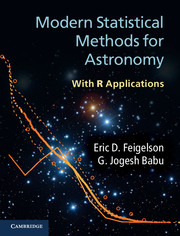Book contents
- Frontmatter
- Contents
- Preface
- 1 Introduction
- 2 Probability
- 3 Statistical inference
- 4 Probability distribution functions
- 5 Nonparametric statistics
- 6 Data smoothing: density estimation
- 7 Regression
- 8 Multivariate analysis
- 9 Clustering, classification and data mining
- 10 Nondetections: censored and truncated data
- 11 Time series analysis
- 12 Spatial point processes
- Appendix A Notation and acronyms
- Appendix B Getting started with R
- Appendix C Astronomical datasets
- References
- Subject index
- R and CRAN commands
- Plate section
1 - Introduction
Published online by Cambridge University Press: 05 November 2012
- Frontmatter
- Contents
- Preface
- 1 Introduction
- 2 Probability
- 3 Statistical inference
- 4 Probability distribution functions
- 5 Nonparametric statistics
- 6 Data smoothing: density estimation
- 7 Regression
- 8 Multivariate analysis
- 9 Clustering, classification and data mining
- 10 Nondetections: censored and truncated data
- 11 Time series analysis
- 12 Spatial point processes
- Appendix A Notation and acronyms
- Appendix B Getting started with R
- Appendix C Astronomical datasets
- References
- Subject index
- R and CRAN commands
- Plate section
Summary
The role of statistics in astronomy
Astronomy and astrophysics
Today, the term “astronomy” is best understood as shorthand for “astronomy and astrophysics”. Astronomy (astro = star and nomen = name in ancient Greek) is the observational study of matter beyond Earth: planets and bodies in the Solar System, stars in the Milky Way Galaxy, galaxies in the Universe, and diffuse matter between these concentrations of mass. The perspective is rooted in our viewpoint on or near Earth, typically using telescopes on mountaintops or robotic satellites to enhance the limited capabilities of our eyes. Astrophysics (astro =star and physis =nature) is the study of the intrinsic nature of astronomical bodies and the processes by which they interact and evolve. This is an indirect, inferential intellectual effort based on the (apparently valid) assumption that physical processes established to rule terrestrial phenomena – gravity, thermodynamics, electromagnetism, quantum mechanics, plasma physics, chemistry, and so forth – also apply to distant cosmic phenomena. Figure 1.1 gives a broad-stroke outline of the major fields and themes of modern astronomy.
The fields of astronomy are often distinguished by the structures under study. There are planetary astronomers (who study our Solar System and extra-solar planetary systems), solar physicists (who study our Sun), stellar astronomers (who study other stars), Galactic astronomers (who study our Milky Way Galaxy), extragalactic astronomers (who study other galaxies), and cosmologists (who study the Universe as a whole).
- Type
- Chapter
- Information
- Modern Statistical Methods for AstronomyWith R Applications, pp. 1 - 12Publisher: Cambridge University PressPrint publication year: 2012



